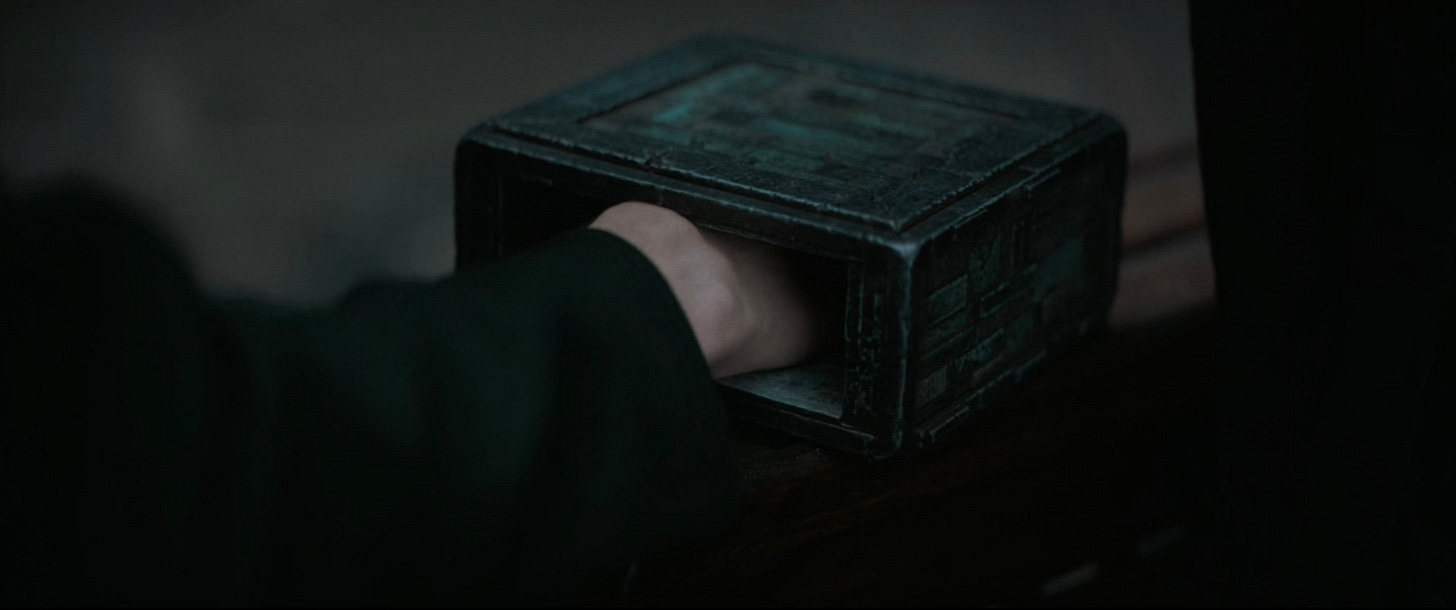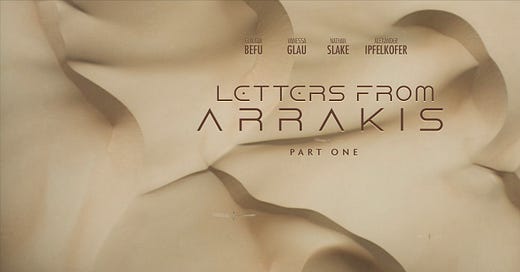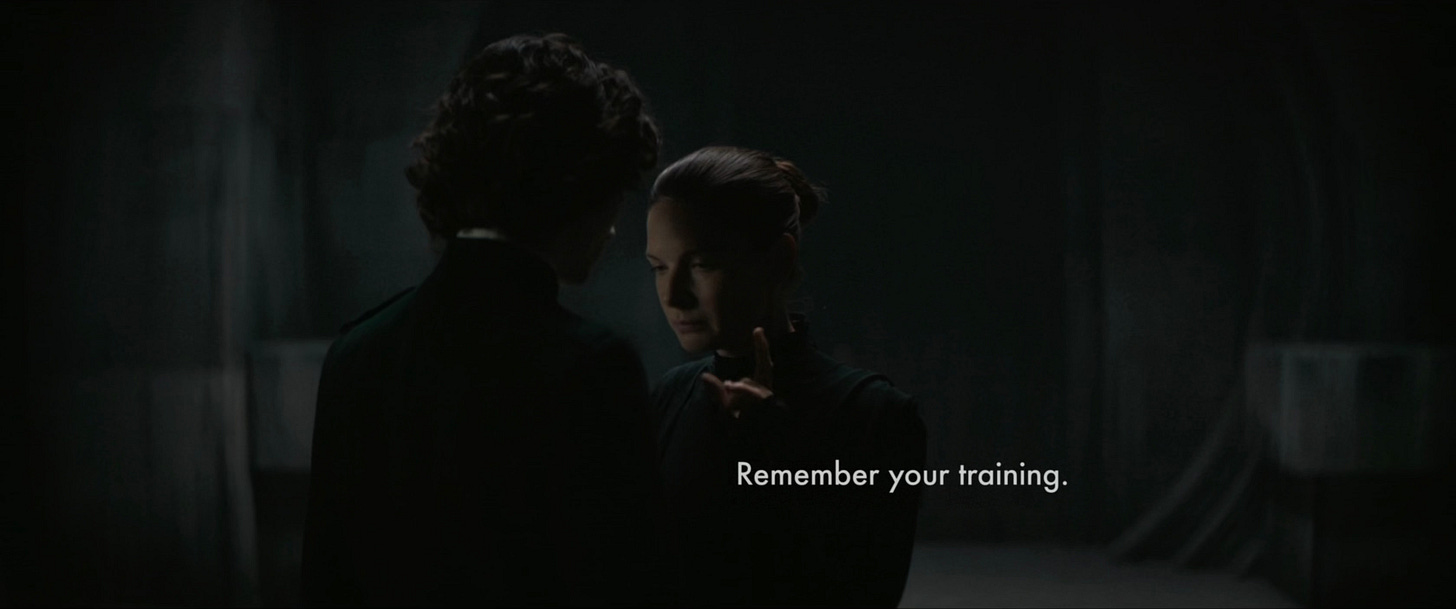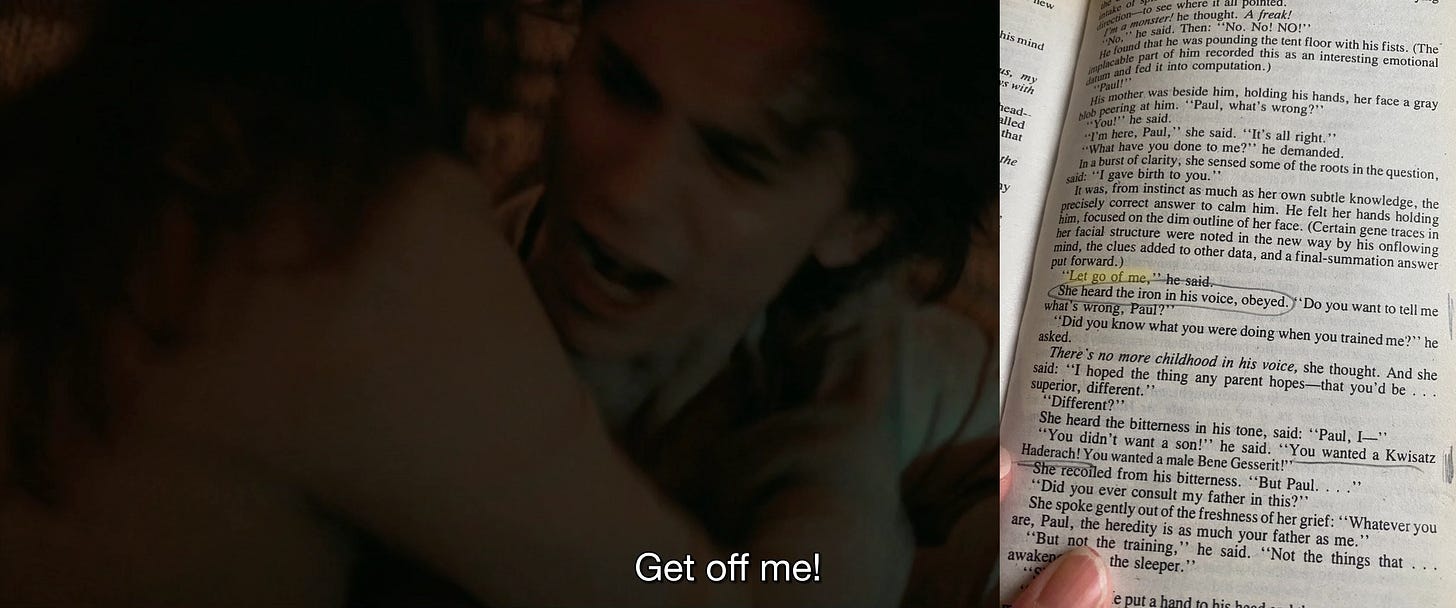Welcome to our first Letter from Arrakis! We hope you’ve had a chance to read the first part (Book One) of Frank Herbert’s Dune. If you have no idea what I’m talking about, here’s the announcement of our communal Dune reread. Before we begin, let’s summarise the events so far...
Book One synopsis
In Dune Book One, Duke Leto Atreides, with son Paul and concubine Lady Jessica, relocate from their home planet Caladan to the desert planet Arrakis to assume control of the production of spice, a valuable, life-altering resource. In doing so, they face political intrigue and rivalry with House Harkonnen, the former rulers of Arrakis. As Leto navigates the delicate balance of power, betrayal leads to his tragic downfall, and Paul and Jessica are forced to seek refuge with the Arrakeen Fremen. Paul's latent psychic abilities begin to surface, and the section ends with the family's fate becoming intertwined with the mysterious desert-dwelling Fremen, setting the stage for the events of Book Two.
What do we remember from our first time with Dune?
Vanessa: I remember little from my first read of Dune several years ago, only that I didn't pick up the second book because the way Herbert portrayed the Fremen culture didn't sit well with me. It might have been the messiah trope. How readily they accept Paul as one of them, even though the harsh climate and hostile living conditions should make them mistrustful of outsiders. How convenient! I could not suspend my disbelief. In retrospect, I might have been too unforgiving. Dune is easier to understand and appreciate as a classic of soft science fiction, ground-breaking for its time.
Claudia: The first time I read Dune in 2004, I was impressed with the resilience of the Fremen people who led a harsh existence on a planet inhospitable for life, squeezed by the profit-greedy Harkonnens, their masters from the outer world. These people had the most noble of dreams: turning their beloved desert planet into a green oasis. The most important ingredient for achieving their goals was one that came in very short supply on Arrakis: water. When I read the book in 2023, the water scarcity on the desert planet hits me with the same intensity as it does Jessica Atreides who ‘found the thought unsettling that water was a major mark of wealth’ on Arrakis.
Alexander: The Duniverse. The mystery. The intrigue. The coming-of-age adventure. When I first read Dune I was fifteen years old—the perfect vessel for Arrakis. Much has changed since, and our memories, fond as they may be, tend to deceive us. Taking my Ace 25th Anniversary Edition (1990) off the shelf, where it had gathered dust over the past 23 years since its purchase, on that fateful day in Vienna… I mean, I had a hard time getting into the prose. It was nothing like I remembered (in translation) but I soldiered on, regardless of all the elfin faces, presently trying to swallow in dry throats, overcome with fatigue. I needed to conquer that desert. A-h-h-h-h, such were the times, I don’t recall that it bothered me back when I read it in German, lack of conjunctions, and whatnot. I finished it nonetheless. Dune is good.
Nathan: The first time I read Dune, I did so without any kind of critique, knowing it was one of those books I really should have already read. (Like, you know, War and Peace…) I enjoyed it. It was good. It filled in some knowledge gaps from all those hours playing Dune II with my brother way back in 1992! I felt nourished by the SciFi, proudly checking it off my Goodreads list. And, well, I left it at that.
So … first impressions of picking the book up again and returning to Frank’s world?
Vanessa: This time around, I recognize that the strength of Dune lies in its worldbuilding. There were many sentences and paragraphs I highlighted simply because they revealed some interesting detail of the world, something I wanted to know more about or analyse in-depth. In true Occam's Lab fashion, I picked one aspect and milked it for all its… spice.
It's like life—it presents a different face each time you take it. Some hold that the spice produces a learned-flavor reaction. The body, learning a thing is good for it, interprets the flavor as pleasurable—slightly euphoric. And, like life, never to be truly synthesized.
Nathan: It’s hard to say it, but after this reread I am left feeling that Dune The Book (Book One, anyway) isn’t all that good. It’s good in a This-Is-Formative-SciFi way, and it speaks to important issues, but it’s not great as a book. Why? Because the writing is, well, rather dull. It’s bland. There’s an interesting story being told, the worldbuilding is certainly strong, but the writing is tedious and plodding and is what I would class as—and I preface this with a sigh—“fine”. The words move the plot along, but they do so in a manner devoid of emotion, leaving me cold and inert. You can argue that that’s irrelevant to a story, but I would argue that it’s integral. Dialogue wavers between utter cringe and excellent, dependent upon the character. We hear inner thoughts purely for exposition and so much is transparent there is no revelation; there are no moments of elation when as the reader you realise something because, in Dune, it’s all forced down your throat. (Reading ahead into Book Two there are moments of redemption, but there are also moments of whatever the word for the opposite of redemption is.)
Alexander: So… I spent most of my time comparing the book to the film. I couldn’t help it. Denis did the impossible and successfully brought the film to the screen! Have you seen Lynch’s Dune (1984)? Lynch ended up hating it so much he had his name removed from extended and TV versions, and he doesn’t even want to watch Villeneuve’s Dune—Dune, I see you.
Nathan: Yep, Denis came along and it’s all HOLY ARRAKIS! DUNE IS GREAT!
Vanessa: I think parts of the book haven’t aged well at all, so yes, at least we have the Hollywood film, for those who want to skip the talk of breeding programs, jihad, and pedophilia (cue sarcasm).
Nathan: It’s aged well. Better than some other books. (Please no-one ever ask me to reread any Heinlein.)
Alexander: Read The Cat Who Walks Through Walls? *snickers*
Claudia: I’m impressed with the width and depth of the social issues that Frank Herbert addressed in his book and how current they are. I don’t think we should skip the selective genetic breeding practiced by the Bene Gesserit for the ruling classes, their distinction between animals and humans, the jihad, the pedophilia, the suppressed attempts of the Fremen people to regreen their planet all in the name of profit. With the rise of extreme politics around the world, free access to online pornography for everyone at any age, the ultra-rich elite scrambling to buy land and create gated utopian communities, and the ever more present ravages of climate change, these topics are more current than ever. It’s a pity that Hollywood doesn’t have the courage to tell-it-as-it-is. That’s why Frank Herbert’s book will always be better than any film.
*Alexander’s eyes widen*
Why is Arrakis such an important part of Dune’s story? (Alexander, you’re allowed to talk about the film.) How do the characters play into it?
Nathan: Arrakis—as a planet, with its Fremen and spice, sandworms and little makers, political placement in a galactic empire—is damn interesting as a setting.
Claudia: Arrakis is a wonderful testimony to the power of greed. The planet that has the most important resource in the entire empire, the spice, is simultaneously the poorest and most exploited by the ruling classes. It’s telling that the rich throughout the empire are hoarding spice while the poor on Arrakis are hoarding water (spoiler!—ed.). Only after arriving on Arrakis do we understand through the eyes of Jessica Atreides that water is the only wealth on the desert planet rich in the spice melange that everyone craves. It’s all a matter of perspective, isn’t it?
Nathan: I agree, and I think this is when Dune the novel is at its best, when the world is woven into the text through the eyes of the newly-arrived Atreides. Take this moment of tenderness with Duke Leto and Paul, which incorporates the harsh reality of the world they find themselves on:
Paul started to speak, but the Duke cut him off, saying: ‘I have to have someone I can say these things to, Son.’ He sighed, glanced back at the dry landscape where even the flowers were gone now—trampled by the dew gatherers, wilted under the early sun.
Nathan (cont.): That’s a beautiful image, and it’s in these rare moments of prose when Dune shines. Duke Leto is often one to reflect on Arrakis:
He had never imagined anything here could be as beautiful as that shattered red horizon and the purple and ochre cliffs. Beyond the landing field where the night’s faint dew had touched life into the hurried seeds of Arrakis, he saw great puddles of red blooms and, running through them, an articulate tread of violet … like giant footsteps. (…) Then he saw the human figures moving into the flow fields, sweeping them with strange scythe-like devices—dew gatherers.
Nathan (cont.): Denis captured this beauty of the seemingly stark planet well, yes?
Alexander: Oh yes, the cinematography of Arrakis is *chef’s kiss*.
00:00:56 (Black Screen)
Chani (V.O.): My planet Arrakis is so beautiful when the sun is low.
CUT TO: Sand Dunes
Chani (V.O.): Rolling over the sands… you can see spice in the air. (…)
Beautiful. This is one of the few instances of VO in the film, for the rest of the numerous inner monologues Denis relies on nonverbal cues, mixed with secret hand signals and plain spoken words, no voice-over (unlike Lynch) and it works.
Alexander (cont.) But I think we should talk about the iconic beginning, first. Frank did a clever thing with the Bene Gesserit. O-h-h-h-h, mystical! Power is the name of the game.
The matriarchal Bene Gesserit possess almost superhuman physical, sensory, and deductive powers developed through years of physical and mental conditioning. (Wiki)

Alexander (cont.): Yet, despite all their powers they can’t tell human from animal. Cue the Gom Jabbar Test. A poisoned needle that only kills animals, and a box. A menacing, pain-inducing box. The Bene Gesserit and their eugenics is a central part of Dune and thus the significance of this test is amplified by the fact that Paul should not exist, could not possibly be “the one.” Or can he?
“I hold at your neck the gom jabbar,” she said. “The gom jabbar, the high-handed enemy. It’s a needle with a drop of poison on its tip. Ah-ah! Don’t pull away or you’ll feel that poison.”
Alexander (… still cont.): A compelling scene, a frightening situation to put anyone in, let alone a child. We are hooked. We are there with Paul, who (no surprise) passes the test, who endures more than any other woman-child.
The Reverend Mother Gaius Helen Mohiam admits her desire to kill Paul. Do you doubt the benevolent nature of these meddling witches?

Alexander (yes, I’m still going): In the book, Paul recalls the “I must not fear” litany, whereas, in the movie, it is spoken by his mother, Jessica. A clever change, more impactful, to have Jessica utter these lines here, crystallising the mother-son relationship.
Claudia: Denis changed a fair bit, didn’t he?
Alexander: Yep. I compared the script to the book and a lot has been cut in places, and I don’t miss any of it. Denis, Jon Spaihts and Eric Roth did a fantastic job. Of course, adaptations won’t replicate the source material word for word. Of course, one needs to cut (Dinner Scene? Snip!), reorder, refocus, distil the essence, and this is exactly what Denis did.
Let’s talk about the Baron. I love what Denis did with this character (Stellan Skarsgård). Lynch’s was a caricature. From the blabbermouth evil clown to the menace of few words, if looks could kill…

Let’s talk Fremen, water, the Bene Gesserit, and Mentats
Nathan: Are those some kind of mints?
Vanessa: With a sour aftertaste.
Claudia (*ignoring Nathan*): Near the start, the Atreides family is met by what looks like a group of adoring fans upon their arrival on the desert planet Arrakis. In the book, Frank Herbert skips the arrival scene in favour of an intimate scene between Jessica Atreides, the Bene Gesserit concubine of the Duke Atreides, and Shadout Mapes, ‘a knobby, grey-haired woman in a shapeless sack dress’ who is a Fremen and very eager to serve Jessica. After they exchange greetings, Jessica hears a ‘weird cry’ from the road outside that she remembers hearing upon their arrival on Arrakis: ‘Ikhut-eigh! Ikhut-eigh! Soo-soo-Sook!’ When she inquires for its meaning, Shadout Mapes replies:
‘Only a water seller, my Lady. But you’ve no need to interest yourself in such as they. The cistern here holds fifty thousand litres and it’s always kept full. Why, you know, my Lady, I don’t even have to wear my stillsuit here! And me not even dead!’
Vanessa: That start is important. It sets up a lot of the world. We are introduced to two factions that play crucial roles in the household and in the world of Dune as a whole: the Bene Gesserit and the Mentats. From the beginning of Book One, Paul's mother Jessica, a Bene Gesserit, and Thufir Hawat, Duke Leto's Mentat, are positioned as polar opposites. As a mystical sect, the Bene Gesserit train their members in control of body and mind, so they may remain calm and collected in any situation.
Claudia: Fear is the mind killer …
Vanessa: It is. The Mentats, on the other hand, are portrayed as mere “computers” in the early 20th century meaning of the word, little more than advanced calculators. Personally, I could not help but read the Bene Gesserit as representing a well-rounded holistic way of life, one superior to the Mentats with their narrow specialization, their black-and-white thinking. East vs. West. Or maybe I just see yin-yang-like dichotomies everywhere. You tell me!
Nathan: There’s certainly a notion of spirituality vs. rationality. Whilst we’re on Jessica, though, I’m going to shoehorn in some thoughts (within thoughts, within thoughts).
Alexander: “Feints”, Nathan. It’s “feints within feints …”
Nathan (*confused look*): Yeah, so there’s way too much telling and not enough showing, and nowhere is this more apparent than in character thoughts, with Jessica falling prey to this often. Take this, ah, jumble of words:
He fears the questions of a Truthsayer, Jessica thought. Who? Ah-h-h, the Reverend Mother Gaius Helen, of course! If he knows he must face her questions, then the Emperor is in on this for sure. Ah-h-h-h, my poor Leto.
Nathan: Ridiculous Ah-h-h-h aside, no one thinks like this. It’s lazy writing, serving to spoon-feed information to the reader. Stop it, Frank. Stop it.
Alexander: Don’t get me started on dry throats and elfin faces.
Nathan (*laughs*): Maybe I’m being harsh. I dunno. Having read Gene Wolfe’s The Book of the New Sun, I don’t feel there’s even a comparison. Dune dies a heat death as every word from Gene’s masterpiece sears beauty into the reader’s mind, to the point that they are blinded by words, unable to read other authors without holding Gene’s command of subtlety and layered meaning as some kind of literary yardstick. I’m biased, clearly. You may disagree with me. I hope you do.
Alexander: Gene Wolfe comes up frequently when you search for “Best prose in SF”. In fact, his name always comes first. They call him a writer's writer. It's my next read.
*Nathan clutches his copy of BotNS to his chest*
Vanessa: I want to read it! Anyway, Dune is clearly partial to the Bene Gesserit and with Herbert's fondness for head-hopping, Paul's perspective does not serve as an explanation. Mentats are made fun of as less than human and one passage even seems to warn against advanced AI.
“Once, men turned their thinking over to machines in the hope that this would set them free. But that only permitted other men with machines to enslave them.”
“Thou shalt not make a machine in the likeness of a man's mind,” Paul quoted.
Nathan: For 1965, I thought that was quite prescient of Frank.
Claudia: I actually like the fact that Frank Herbert chose to develop human abilities beyond anything we consider, well, human today. It’s a topic I’ve been reflecting on ever since ChatGPT entered our lives at the beginning of 2023. There was a study about AI and creativity which concluded that while AI is more creative than most people, it’s not more creative than the most creative people. Aren’t we missing out on an opportunity here? Shouldn’t we invest more in developing humans? Bene Gesserit, Mentats, even doctor Yueh, whatever they think of each other in Dune, as a reader I’m impressed with their training and skills. There’s very little talk about technology that enhances human abilities. There’s a guy who was born color blind and he installed an antenna on his skull. Now he can hear colors! It took his brain three years to learn the sound frequency associated with every color. He gets the information in the form of vibration transmitted through bone. Isn’t this amazing? I think that this is the future. Nobody talks about it. Yet.
Nathan: You’re talking about it. That’s a start. There’s probably a lot being done in various areas of research that doesn’t get featured in mainstream media. (Source: am a scientist.) Alexander, I see you ready to speak. More thoughts on the book vs. film?
Alexander: You see well. The book has strong female characters in a male-dominated storyline, focusing on political intrigue and infighting. The film has less of the latter, more of the former. Putting the female characters up front and centre was Denis’ main prerogative—he told Eric Roth as much when they started working on the script.
Vanessa: You know all the film facts!
Alexander: Did you know the Dune screenplay was written in MS-DOS? Anyway, at the end of Book One, after their escape, Paul and his mother are in the tent when he uses the Voice on her, no longer a child.
‘Let go of me,’ he said.
She heard the iron in his voice, obeyed. ‘Do you want to tell me what’s wrong, Paul?’
’Did you know what you were doing when you trained me?’ he asked.
There’s no more childhood in his voice, she thought.
Alexander: As Claudia said, there’s no mention of “jihad” in the movie either, most likely due to Hollywood’s marketing concerns which dictate many choices and directions, but, again, calling it a holy war or a “jihad,” is this how we measure an adaptation of something that has widely been deemed unfilmable, uncontainable? Or Dr Liet Kynes’ gender? Does it matter? Kynes is such a strong character, the motivations and actions are what matter, and I loved Sharon Duncan-Brewster as Kynes.
Nathan: It doesn’t matter. Not to me. The Fremen are the strongest parts of Dune. Frank manages to use them as a valid means of exposition and worldbuilding, whilst also giving them life and believability and a planet they have deep association with. Kynes is the pinnacle of this organic exposition, whilst also serving as a means to allude to Paul’s prescience:
Kynes stared at him [Duke Leto], seeing the water-fat flesh. He spoke coldly: ‘You never talk of likelihoods on Arrakis. You speak only of possibilities.’
[To Paul]: ‘Your desert boots are fitted slip-fashion at the ankles. Who told you to do that?’
‘It… seemed the right way.’
‘That it most certainly is.’
Alexander: Kynes was originally the main protagonist. I guess the story didn’t work with Kynes succeeding in terraforming Arrakis, so Frank followed Faulkner’s advice to Kill all your darlings.
Nathan: I did not know that fact. I’ll remember that.
Alexander: He was also named Bryce. Yep.
Nathan: Bryce? I'm going to forget that fact now.
Claudia: Yes, Bryce Kynes, he wanted to terraform Arrakis into a lush, green planet with abundant natural water. Some of that comes in Book Two, but water plays such an important role in Dune. At the start, we learn that the Atreides cistern holds fifty thousand litres of water. This is a rich household with staff, servants and an army who needs to eat, wash and clean daily. To put this into perspective, Americans use about 310 litres (82 gallons) of water per day and waste about 113 litres (30 gallons) of water daily. In contrast, when Jessica defiantly asks Shadout Mapes if she should have made a deeper cut on her breast with the krisknife, the Fremen woman promptly answers:
‘Ah, no! The body’s water is scant enough ‘thout gushing a wasteful lot of it into the air'.’
Claudia (cont.): Did you know that it takes 2,700 litres of water to make just one t-shirt? Think about it: every time I wear a t-shirt I carry 2,700 litres worth of water on me. It makes you wonder how come an H&M or Target t-shirt can sometimes cost as little as a few euros or dollars. Water is a resource that companies can freely use but it doesn’t come for free. The Aral Sea dried up after its waters were diverted for irrigating cotton plantations. In an otherwise very dry area, the only source of water—a whole sea!—was wasted on making t-shirts. Left without water, the locals who could not afford to move away, now had to buy water from a truck.
Nathan: That’s … a ridiculous amount of water. I feel bad owning t-shirts now. (Hold that thought. Let’s come back to water storage when we get to Book Two …)
Claudia: For the Fremen? Yes. But like Jessica, I feel ‘a sense of oppression at the importance of water on Arrakis’ or, in this case, the Aral Sea area. Usually, the countries who grow the cheap cotton needed for our t-shirts are some of the most arid areas in the world.
And so what of Paul?
Vanessa: Other characters describe Paul as the best of both worlds, Bene Gesserit and Mentat. Trained by both his mother and his father's Mentat from a young age (without his knowledge, by the way), he has absorbed both teachings and is already starting to surpass his teachers—as he must, of course, being the Kwisatz Haderach.
Nathan: Is that a spoiler?
Vanessa: I don’t think so. It’s hinted at very early on.
*Alexander and Claudia nodding*
Vanessa: The Bene Gesserit refuse religion as a label yet it is one of their most used tools. (Another dichotomy: religion vs. science?) So what do they train for? They have members in high political positions, all the way up to the imperial household. Only Baron Harkonnen mistrusts them. All Bene Gesserit we meet or hear about are women, tasked with bearing female children to preserve certain genes—eugenics. They planted the Kwisatz Haderach legend in Fremen religion to create an emergency shelter for their own on Arrakis—which conveniently allows Paul and Jessica to escape from the Harkonnens.
All that for what?
Alexander: What’s their endgame? Control the Kwisatz Haderach, control the universe?
“I am Bene Gesserit: I exist only to serve,” Jessica quoted.
Nathan: To allow the plot stuff to occur?
Vanessa: But who are they serving? Few answers in Book One. After the Gom Jabbar test, there’s this from The Reverend Mother:
The original Bene Gesserit school was directed by those who saw the need of a thread of continuity in human affairs. They saw there could be no such continuity without separating human stock from animal stock–for breeding purposes.
Vanessa (cont.): Could you be any more cryptic? I do hope Herbert addresses this question later in the book or even in the series. Book One certainly planted some expectations regarding the Bene Gesserit, their influence on Arrakis and in the galaxy, and Paul's role in all of it.
We’ve talked for long enough. Closing thoughts on Book One?
Claudia: Many years ago, it was inconceivable that a book like Dune will ever enter the mainstream consciousness. But less than 20 years later, our collective mind has changed so much, that this story with a profound message and call for change, is now part of our mainstream culture.
Nathan: We have Denis to thank for that, I think, (and Timothée! We haven’t spoken about Timothée!). Obviously also thanks to Frank—you did write the book, even if I grumble at your prose. You’re right, Claudia, there’s an ecological message there, but I think that’s going to be clearer when we think of the whole book. For me, Book One serves to introduce us to the world of Arrakis and the major characters, all of whom become central in Book Two. The secrets of Arrakis and the Fremen, the hopes and plans that Kynes has for the planet, the transformation that Paul and Jessica undergo—all these await. Sadly, I fear Frank’s prose will remain as coarse as the desert sands.
Vanessa: It will. I was relieved to have enjoyed Book One as much as I did. Through engaging with Dune again and discussing it with you, I have gained a much more nuanced understanding and appreciation than when I read it for the first time. The film contributed to this experience as well.
Alexander: In the film, many elements were cut and reordered to create tension and focus on Paul’s turmoil, like with the tent scene at the end of Book One. The air, heavy with Spice, triggers more visions. Jessica thinks Paul is the Kwisatz Haderach, but Paul says he isn’t. He wants to be a son, thinks he’s a monster, instead, he will be…
… Muad’Dib!
So, readers, tell us what you think of Book One! What resonated? What do you like, what do you dislike? Do you agree with our many and varied thoughts?
Our next letter from Arrakis, covering Book Two of Dune, will be delivered by ‘thopter on January 15, 2024. Until then, The Spice Must Flow.










On the point of movie vs book: Asking my family, who hasn't read the book before watching the movie, the Mentats were totally lost on them. They were seen only as a kind of normal adviser without any special ability. The eye turning white while calculating used by Denis to denote the mental calculation activity wasn't picked up.
Like Alexander, I was fifteen when I read it. (I even have the same edition.) Back then, I liked it a lot—especially the Bene Gesserits and Mentats. I had already seen Lynch's Dune, so that colored my reading of the book some. But I would say I probably missed a lot of the nuance and religious commentary until I reread it as an adult.
Like Nathan, I think the prose is pretty dull and uninspiring. Herbert is a bit like PKD (I'm sad to say) in this way, meaning the ideas are better than the writing. He also screws up matters of scale quite a bit, but kina who cares. Few of us are here for any of that. Not a hard sf book and that's okay.
I still love the concept of folding space as a means of FTL travel, and that the 'fuel' is this psychoactive drug that is mined—all that is brilliant and bizarre. In fact the whole book is way more bizarre than it presents itself to be or has ever been interpreted in film. Speaking of ...
I don't care for Villanue's film. I can appreciate that it's well made, and I get that he toned it down for mass appeal, but to me that is a massive downgrade. The SF Channel miniseries is probably the best overall in terms of faithfulness, but is also perhaps the least interesting to watch, so.
Anyhow, thanks to all of you for doing this! It's fun to read!